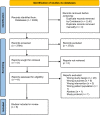Multivitamin use and risk of preeclampsia: A systematic review and meta-analysis
- PMID: 35388472
- PMCID: PMC9812096
- DOI: 10.1111/aogs.14356
Multivitamin use and risk of preeclampsia: A systematic review and meta-analysis
Abstract
Introduction: Preeclampsia is associated with adverse maternal and neonatal outcomes. It is unclear whether multivitamin use reduces the risk of preeclampsia. This systematic review and meta-analysis aimed to evaluate the association between multivitamin use and the risk of preeclampsia.
Material and methods: We searched PubMed, Embase and the Cochrane Library from database inception to July 2021. Randomized controlled trials (RCTs), case-control and cohort studies assessing the association between multivitamin use and risk of preeclampsia were eligible. Studies of treatment with a single micronutrient were excluded. Relative risks and 95% confidence intervals (95% CI) were calculated using random-effects models. RoB2, the Newcastle Ottawa Scale and GRADE were used to assess risk of bias and quality of evidence. The protocol was registered in PROSPERO (no. CRD42021214153).
Results: Six studies were included (33 356 women). Only two RCTs were found, both showing a significantly decreased risk of preeclampsia in multivitamin users. These studies were not compatible for meta-analysis due to clinical heterogeneity. A meta-analysis of observational studies using a random-effects model showed an unchanged risk of preeclampsia following multivitamin use (relative risk 0.85, 95% CI 0.69-1.03). The quality of evidence according to GRADE was very low.
Conclusions: Very weak evidence suggests that multivitamin use might reduce the risk of preeclampsia; however, more research is needed. Large RCTs should be prioritized. The results of this review do not allow any final conclusions to be drawn regarding a preventive effect of multivitamin use in relation to preeclampsia.
Keywords: HELLP; eclampsia; micronutrients; multivitamin; preeclampsia; pregnancy; pregnant women.
© 2022 The Authors. Acta Obstetricia et Gynecologica Scandinavica published by John Wiley & Sons Ltd on behalf of Nordic Federation of Societies of Obstetrics and Gynecology (NFOG).
Conflict of interest statement
None to declare.
Figures
Comment in
-
Multivitamin use may lower risk of preeclampsia: A meta-analysis.Acta Obstet Gynecol Scand. 2022 Oct;101(10):1174-1175. doi: 10.1111/aogs.14403. Epub 2022 Jun 9. Acta Obstet Gynecol Scand. 2022. PMID: 35681265 Free PMC article. No abstract available.
-
Reply: Multivitamin use may lower risk of preeclampsia: A meta-analysis.Acta Obstet Gynecol Scand. 2022 Oct;101(10):1176-1177. doi: 10.1111/aogs.14417. Epub 2022 Jul 12. Acta Obstet Gynecol Scand. 2022. PMID: 35818958 Free PMC article. No abstract available.
References
-
- Abalos E, Cuesta C, Grosso AL, Chou D, Say L. Global and regional estimates of preeclampsia and eclampsia: a systematic review. Eur J Obstet Gynecol Reprod Biol. 2013;170:1‐7. - PubMed
-
- Vigil‐De GP. Maternal deaths due to eclampsia and HELLP syndrome. Int J Gynecol Obstet. 2009;104:90‐94. - PubMed
-
- World Health Organization International Classification of Diseases and Related Health Problems, 10th Revision. World Health Organization; 2016. Contract No.:May 22.
-
- Sjónsdóttir L, Arngrimsson R, Geirsson RT, Slgvaldason H, Slgfússon N. Death rates from ischemic heart disease in women with a history of hypertension in pregnancy. Acta Obstet Gynecol Scand. 1995;74:772‐776. - PubMed
-
- Smith GC, Pell JP, Walsh D. Pregnancy complications and maternal risk of ischaemic heart disease: a retrospective cohort study of 129 290 births. Lancet. 2001;357:2002‐2006. - PubMed
Publication types
MeSH terms
Substances
LinkOut - more resources
Full Text Sources



